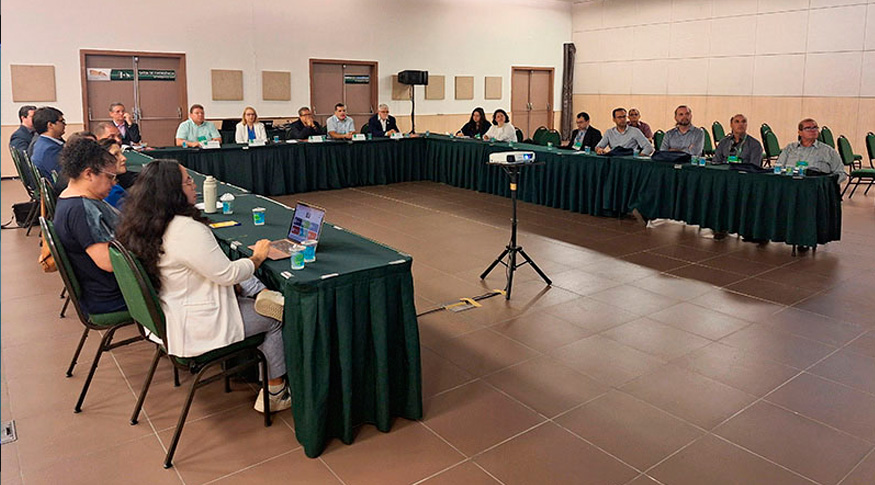Triple Forum
In the Triple Forum, IBGE launches SDG Module focused on indicators and challenges in Brazil
June 12, 2025 12h58 PM | Last Updated: June 16, 2025 12h01 PM

The Brazilian Institute of Geography and Statistics (IBGE) launched on Wednesday afternoon (11) the third thematic module of the series Creating Synergies between the 2030 Agenda and the G20. The publication focuses on Sustainable Development Goal (SDG) 3, which deals with health and well-being, bringing together a set of crucial indicators, detailing Brazil's position in relation to other G20 member countries and revealing regional disparities within the country itself.
The IBGE publication aims to provide essential information to monitor Brazil's progress towards the global goals of the 2030 Agenda and identify areas that require greater attention to advance health and well-being in the country. See the publication here.
The Triple Forum is organized by the Brazilian Institute of Geography and Statistics (IBGE), in cooperation with Ceará State Government, held from June 11 to 13, at the Ceará Events Center (Av. Washington Soares, 999, West Pavilion, gate C). Registration is still open and the schedule is available on the event portal. The Forum is supported by the UN Development Programme (PNUD), do Banco do Nordeste do Brasil (BNB), United Nations Children´s Fund (UNICEF), Ceará Without Hunger, Company of Participation and Assets Management of Ceará S.A. (Ceará Par), Secretariat of Tourism of Ceará, National Secretariat of Youth - General Secretariat of the Presidency of the Republic and other partners. Plenary sessions will be sreamed live on IBGE digital, an on the Institute's social media channels IBGE Digital, Youtube, Instagram, TikTok and Facebook.
Creating Synergies between the 2030 Agenda and the G20 series
During the launch, Denise Kronemberger, cocoordinator of the 2030 Agenda Project at the IBGE, contextualized the Sustainable Development Goals (SDGs) and the targets established by UN member countries, emphasizing that there are six years left to fulfill the Agenda. “Only 17% of the targets have been achieved so far. This is because we had the Covid-19 pandemic in the middle of this journey. We are in a climate emergency situation, facing several conflicts, several wars. The expense is very high, it is an expense that is displaced from achieving the Agenda's targets to other actions.” The coordinator also highlighted that Brazil stands out from other countries by integrating statistics and geosciences, an aspect that is highlighted in the "Creating Synergies" series.
Marco Antônio de Andreazzi, Health Statistics Manager at the IBGE, presented the new module, which delves into Sustainable Development Goal (SDG) 3 – Good Health and Well-Being and offers a detailed analysis of several indicators. The SDG Health Module is a vital tool for the analysis and formulation of public policies, allowing in-depth understanding of inequalities and progress in the Major Regions of Brazil.
The second edition of the Maps Module, which is part of the "Creating Synergies" collection, was also launched at the event. The publication was presented by Ricardo Neves de Souza Lima, a civil servant from the Customer Service and Information Division. This edition shows world maps of all the indicators on the topics already covered in previous publications, with Brazil highlighted in the center of the map. As a new feature, it includes maps and graphs from the recently launched thematic module on Health.
Ricardo also showed the section on the IBGE Geographic Atlas website with the maps of the indicators. “On the website, for each indicator, you will find an interactive map and a graph. The map covers all the countries with information available for a given indicator, presenting the most recent data or a composition that allows for relevant comparison between the data of countries. It is also possible to select the G20 member countries to view their graphs with the time series,” Ricardo explained.
The discussion panel also included representatives from institutions in the state of Ceará. Dimas Costa, President of the Training and Development Center (Cetrede), was the mediator, leading the discussion. Fabio Montenegro, Director of the School of Public Management of the Ceará Research Institute on Economic Strategy (Ipece), made a relevant speech on how the SDGs are applied in the Institute's activities.





SDG Health Module Indicators
Among the indicators presented were health statistics related to mortality. In 2022, Brazil recorded the fourth highest rate among G20 member countries in terms of both under-5 mortality and neonatal mortality.
As for the suicide mortality rate, in 2019, Brazil had the sixth lowest rate (6.9 per 100,000). In addition, the module analyzes the mortality rate from traffic accidents, which fell significantly between 2012 and 2022, but still remains a challenge.
The publication also addresses the mortality rate from chronic diseases, presenting data on deaths from diseases of the circulatory system, malignant tumors, diabetes mellitus, and chronic respiratory diseases. For these causes, Brazil had one of the highest mortality rates among the G20 member countries in 2022.
Finally, the vaccination coverage rate was addressed in 2022, an indicator in which Brazil stands out with the worst coverage for measles and DTP (diphtheria, tetanus, and pertussis) compared to the other countries analyzed. "Above 80% is considered a minimum vaccination coverage to ensure a population component of protection. Above this percentage, you can reduce the rate of spread of the virus," explained Marco Antônio de Andreazzi. The publication also includes coverage for MMR, pneumococcal, and HPV, highlighting the need for advances in immunization campaigns. See the publication here.




















